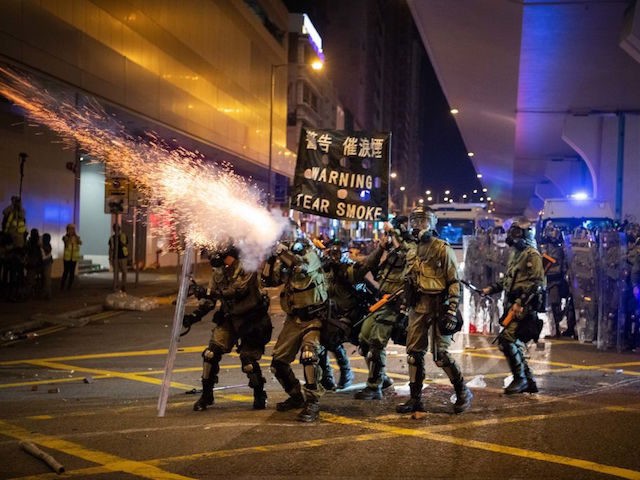Hong Kong police officials on Friday announced that former Deputy Commissioner Alan Lau is coming out of retirement to accept a temporary position as second-in-command of the force, with a focus on controlling the enormous anti-government protests that have rocked the island.
Lau, who retired late last year, was instrumental in suppressing the 2014 democracy movement, the most vigorous challenge to China’s authority until now.
China’s state-run Global Times applauded the return of Lau, referred to by his Chinese name Lau Yip-shing, saying:
Lau is likely to be the highest-ranking commander for the operation codenamed “Tiderider,” initiated in mid-June to target protests and unrest triggered by the proposed extradition bill, Chan Cho-kwong, chairman of the Hong Kong Junior Police Officers Association, told the Global Times.
According to the government of the Hong Kong Special Administrative Region, Lau was appointed to the temporary post of Deputy Commissioner of Police (Special Duty) on Friday. The main duties of this post are to assist the Commissioner of Police in handling large-scale, public order events and steering forthcoming major operations, including the celebratory activities surrounding the 70th anniversary of the founding of the People’s Republic of China.
“Special Duty” refers to a designated position, which was previously below the rank of Chief Superintendent. The position at the Chief Superintendent level is unprecedented, Chan said.
The Global Times praised Lau for “dealing with the riots in Mong Kok during the 2014 Occupy Central Movement” and hoped he could likewise handle the current protest movement, which has “turned into a series of riots targeting the Hong Kong government” in the Chinese Communist paper’s view.
Mong Kok is an extremely crowded part of Hong Kong that often becomes the scene of rowdy behavior during times of public protest. In 2016, a protest against the government for cracking down on unlicensed street vendors grew out of hand when participants started throwing fishballs at police, then escalated to bricks, bottles, and a cart full of boiling oil.
In the early stages of the current protest, those who marched through Mong Kok were praised for not descending into flying fishball levels of chaos, but some arrests have been made there recently and shops have been closing early as tensions increased.
The Global Times also saluted a group of Hong Kong residents who rallied to support the police at their headquarters and brought them “large quantities of convenient foods such as cup noodles, energy bars, herbal tea drinks, and biscuits.” The article counted about 100 pro-police demonstrators, which is much smaller than the number of Hong Kongers currently upset with the police for using excessive force.
The South China Morning Post said Lau is “well-known for his tough style of leadership” and was credited with adroitly handling security when Chinese Communist Party chief Xi Jinping visited Hong Kong in 2017. His new post is expected to last for six months, which will cover the upcoming 70th anniversary of the founding of Communist China.
One source described Lau’s return as an “extremely rare” move, an implicit rebuke of current second-in-command Chris Tang Ping-keung, and an “earthquake” for other top officials.
The Hong Kong Free Press noted Lau spearheaded an internal review committee after the 2016 Mong Kok riot, which might be taken as an encouraging aspect of his resume by protesters who have been demanding a full and independent review of police actions over the past few weeks.
Other observers speculated Lau’s return is a sign that Hong Kong officials, or their bosses in Beijing, no longer trust Hong Kong’s current police leadership to handle the protests – either because they think the police have behaved in an excessive manner and made things worse, or because they doubt the current leadership is prepared to get as rough as Beijing wants them to be.
Lau’s reactivation could also be a signal from Hong Kong executives to Beijing that a leader trusted by the mainland government will now be in charge of the police response, or a signal to nervous foreign travelers that it will be safe to visit the island.

COMMENTS
Please let us know if you're having issues with commenting.